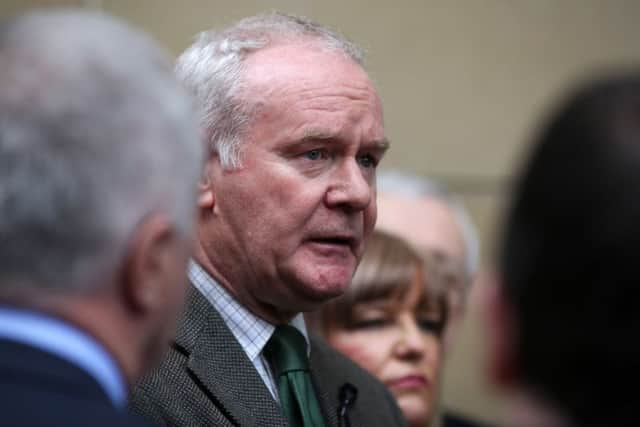Ex-IRA chief to appoint member of '˜truth commission' for victims


The former IRA commander will be able to appoint a commissioner to the Independent Commission on Information Retrieval (ICIR), the body to which families who want to receive information outside the criminal justice system would go to get information on their loved one’s death.
The ICIR dates back to the Haass talks in 2013 and it is not yet clear when – if ever – the body will come into being.
Advertisement
Hide AdAdvertisement
Hide AdHowever, an international treaty setting out the terms for the body whenever it is established has been signed by the British and Irish governments. Late last week a copy of that treaty was tabled at Westminster.
Last year it emerged that Mr McGuinness would have a veto over the head of another body to be set up if another aspect of the Stormont House Agreement happens.
Mr McGuinness and First Minister Arlene Foster will jointly appoint the head of the Historical Inquiries Unit, which will investigate hundreds of murders by Mr McGuinness’s former terrorist colleagues.
According to the treaty laid before Parliament last week, the ICIR will be able to examine Troubles deaths between 1 January 1966 and 10 April 1998.
Advertisement
Hide AdAdvertisement
Hide AdThe commission will be headed by a chairman “who may be of international standing” who will be appointed after consultation with the First and Deputy First Ministers.
There will be one member each appointed by the British and Irish governments and two members appointed jointly by the First Minister and the deputy First Minister.
The chairman will have a veto on decisions of the commission.
Information provided to the ICIR cannot be used to prosecute individuals, but they will only have limited immunity which is based on their testimony to the ICIR (if they agree to cooperate, which is not compulsory), meaning that if the information emerges elsewhere there will be no legal bar on them being prosecuted.
Advertisement
Hide AdAdvertisement
Hide AdAt the end of the five year period, the commission will be legally bound to destroy “all the information it holds about deaths within its remit” and “all the records it holds that relate to such information”.
The treaty explicitly states that individuals who cooperate with the ICIR will not have immunity from prosecution if the information emerges via other means: “Paragraph 1 of this Article does not affect the admissibility of the same information that is otherwise in the possession of any person.”
The commission will be legally barred from even revealing the names of those who have contacted it with information about Troubles deaths
And it will be a criminal offence to publish any information which reveals details of an investigation by the commission into a Troubles death.
Advertisement
Hide AdAdvertisement
Hide AdIf the Commission receives information about a death within its remit but no close family member has requested information about the death, the commission will store the information in case a family request is made later.
However, the commission will be barred from initiating contact with the family. But because the information will be destroyed after the five-year life of the commission, if the family was to decide to seek out information after that period, any documentation would have been destroyed.
The commission will also employ ‘intermediaries’, seemingly to act as go-betweens with former terrorist groups in an attempt to identify those who may have information about particular killings.
The News Letter asked the NIO whether the “intermediaries” who would seek to establish contact with those responsible for murders would be paid, and, if so, whether former paramilitaries will be excluded from acting as intermediaries.
Advertisement
Hide AdAdvertisement
Hide AdAn NIO spokeswoman said: “It is not envisaged that the ICIR will pay intermediaries.”
In a written statement to the House of Commons last week which accompanied a copy of the nine-page treaty between the two governments, Ms Villiers said: “It had been our aim to lay the treaty before Parliament at the same time as introducing the legislation required to establish the legacy bodies.
“However, as agreement has not yet been reached on this legislation, this is not possible.”
Freedom of Information law exemption for ICIR
The new Troubles’ ‘truth commission’ will be exempt from both the Freedom of Information Act and the Data Protection Act, the treaty between the UK and the Republic of Ireland reveals.
Advertisement
Hide AdAdvertisement
Hide AdThe treaty states: “Freedom of Information, Data Protection and National Archives legislation shall not apply to the Commission.”
Although it would never have been expected that Freedom of Information requests for details of former terrorists’ admissions or requests from families would have been successful, the blanket exemption from FoI means that even basic information such as how much the body is spending on hospitality or paying consultants will not be directly available to the public.
An NIO spokeswoman said: “The Stormont House Agreement set out that the ICIR should ‘be given the immunities and privileges of an international body and would not be subject to judicial review, Freedom of Information, Data Protection and National Archives legislation, in either jurisdiction.’
“Article 8 of the Treaty achieves this.”
Template from existing body
The ICIR is based on the organisation which has worked to recover the bodies of The Disappeared, the Independent Commission on the Location of Victims’ Remains.
Advertisement
Hide AdAdvertisement
Hide AdSince then, many – though not all – of the bodies of The Disappeared have been recovered.
That commission is headed by two retired senior civil servants, Sir Ken Bloomfield and Frank Murray.
Under the Stormont House Agreement, the ICIR is to be “entirely independent from the justice system” and will be unable to disclose information to the justice system or intelligence agencies.